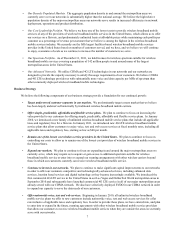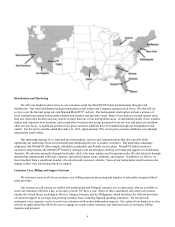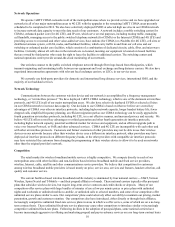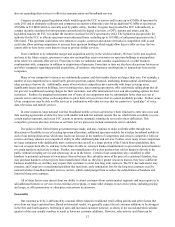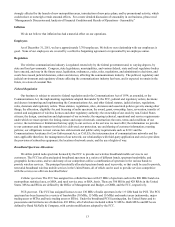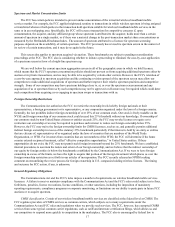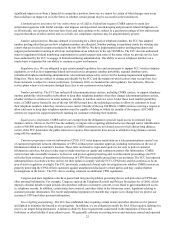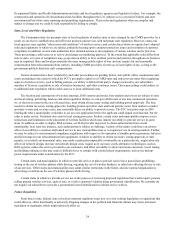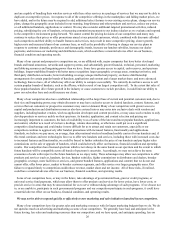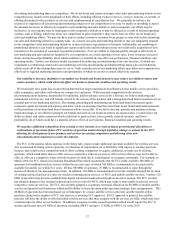Metro PCS 2011 Annual Report Download - page 28
Download and view the complete annual report
Please find page 28 of the 2011 Metro PCS annual report below. You can navigate through the pages in the report by either clicking on the pages listed below, or by using the keyword search tool below to find specific information within the annual report.17
Spectrum and Market Concentration Limits
The FCC has certain policies intended to prevent undue concentration of the terrestrial wireless broadband mobile
services market. For example, the FCC applies heightened scrutiny to transactions in which wireless spectrum is being assigned
or transferred whenever both parties to the transaction hold spectrum suitable for wireless broadband mobile services in the
same or in an overlapping area. Specifically, the FCC will screen a transaction for competitive concerns if, upon
consummation, the acquirer, and any affiliated group whose spectrum is attributed to the acquirer, holds more than a certain
amount of spectrum in a single market, or if there was a material change in the post-transaction market share concentrations as
measured by the Herfindahl-Hirschman Index. The amount of spectrum attributed to a licensee for spectrum screening
purposes depends on the availability of certain spectrum. The FCC previously has revised its spectrum screen in the context of
its review of certain transactions, and it may do so again in the future.
This screen also applies to spectrum acquired via auction. These benchmarks are subject to pending reconsideration
proceedings at the FCC. The FCC also is considering whether to initiate a proceeding to eliminate the case-by-case application
of a spectrum screen in favor of a bright-line spectrum cap.
We are well below the current spectrum aggregation screen in all of the geographic areas in which we hold licenses,
which means that the FCC's spectrum concentration policies should not prevent us from acquiring additional spectrum either by
auction or in private transactions, and we may be able to be acquired by certain other carriers. However, the FCC's retention of
a case-by-case approach to spectrum acquisition and the continuing revision upward of the spectrum screen may allow our
competitors to make additional acquisitions of spectrum and further improve their relative spectrum positions and competitive
strength. Some of our competitors may have spectrum holdings close to, at, or over the spectrum screen amount and any
acquisition of us or spectrum from us by such competitors may not be approved or divesture may be required which could deter
such competitors from acquiring us or engaging in spectrum swaps or transactions with us.
Foreign Ownership Restrictions
The Communications Act authorizes the FCC to restrict the ownership levels held by foreign nationals or their
representatives, a foreign government or its representative, or any corporation organized under the laws of a foreign country.
Generally, the law prohibits indirect foreign ownership of over 25% of our common stock. Our stock is freely tradable on the
NYSE and foreign ownership of our common stock could exceed this 25% threshold without our knowledge. If ownership of
our common stock by non-United States citizens or entities exceeds 25%, the FCC may revoke licenses or require us to
restructure our ownership or we may be required to purchase such interest to reduce our foreign ownership below 25%.
However, the FCC may waive the foreign ownership limits for CMRS licensees, such as us, and generally permits additional
indirect foreign ownership in excess of the statutory 25% benchmark particularly if that interest is held by an entity or entities
that are citizens of, representatives of or organized under the laws of countries that are members of the World Trade
Organization, or WTO. For investors from countries that are not members of the WTO, the FCC will determine if the home
country extends reciprocal treatment, called “effective competitive opportunities,” to United States entities. If these
opportunities do not exist, the FCC may not permit such foreign investment beyond the 25% benchmark. We have established
internal procedures to ascertain the nature and extent of our foreign ownership, and we believe that the indirect ownership of
our equity by foreign entities is below the benchmarks established by the Communications Act. If we were to have foreign
ownership in excess of the limits, we have the right to acquire that portion of the foreign investment which places us over the
foreign ownership restriction as set forth in our articles of incorporation. The FCC recently released an NPRM seeking
comment on streamlining the review process for foreign ownership in U.S. companies holding wireless licenses. The timing
and outcome for FCC action, if any, is unknown.
General Regulatory Obligations
The Communications Act and the FCC's rules impose a number of requirements on wireless broadband mobile services
licensees. A failure to meet or maintain compliance with the Communications Act and the FCC's rules could subject us to fines,
forfeitures, penalties, license revocations, license conditions, or other sanctions, including the imposition of mandatory
reporting requirements, compliance programs or corporate monitoring, or limitations on our ability to participate in future FCC
auctions or to acquire spectrum.
CMRS classification. Certain of our wireless broadband mobile services are classified at the federal level as CMRS. The
FCC regulates providers of CMRS services as common carriers, which subjects us to many requirements under the
Communications Act and FCC rules and regulations when we provide such services. The FCC, however, has exempted CMRS
services from some typical common carrier regulations, such as tariff and interstate certification filings, which allows us and
our competitors to respond more quickly to competition in the marketplace. The FCC also is encouraged by federal law to


